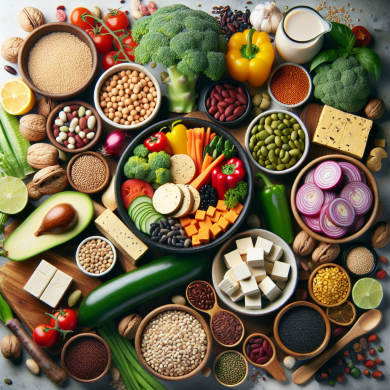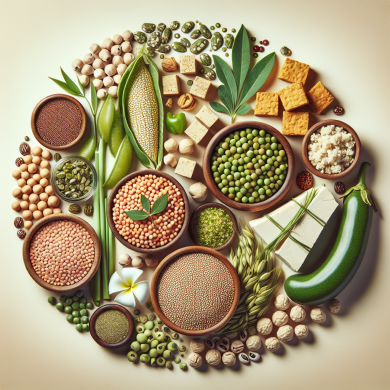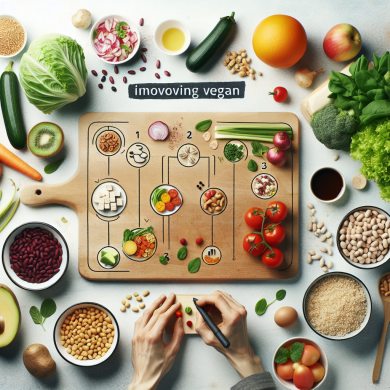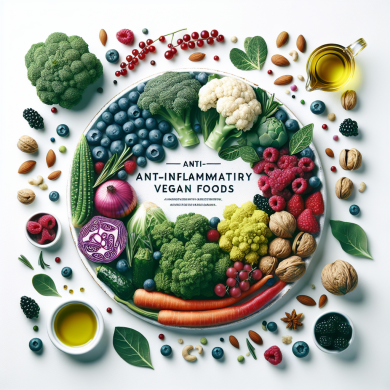Power Up: Vegan Diets for Peak Athletic Performance
Introduction
The world of athletic performance is ever-evolving, with athletes constantly seeking ways to enhance their capabilities. One emerging trend is the adoption of vegan diets, which are being recognized not just for their ethical and environmental benefits but also for their potential in boosting athletic performance. This article explores how a vegan diet can power athletes to new heights, offering insights into the nutritional strategies and benefits of plant-based eating for peak athletic performance.
The Rise of Veganism in Sports
In recent years, there has been a noticeable shift in the dietary habits of athletes across various sports. High-profile athletes, from ultramarathoners to bodybuilders, have publicly embraced vegan diets. This trend is driven by multiple factors, including health benefits, ethical considerations, and increasing awareness of the environmental impact of animal agriculture.
Vegan diets focus on plant-based foods, eliminating all animal products. This includes fruits, vegetables, grains, nuts, seeds, and legumes. With careful planning, a vegan diet can meet all the nutritional requirements needed to support intense physical activity and recovery, making it an appealing choice for athletes.
Nutritional Considerations for Vegan Athletes
While a vegan diet can support athletic performance, it is crucial for athletes to pay attention to their nutritional intake to ensure they are meeting their specific needs. This includes adequate consumption of protein, vitamins, minerals, and other essential nutrients.
Protein Intake
One of the primary concerns for athletes on a vegan diet is obtaining sufficient protein, which is vital for muscle repair and growth. Plant-based sources of protein include legumes (such as lentils and chickpeas), tofu, tempeh, seitan, quinoa, and various nuts and seeds. Combining different plant proteins throughout the day can provide all the essential amino acids.
Iron and Vitamin B12
Iron is crucial for oxygen transport and energy production, while Vitamin B12 is essential for nerve function and the production of red blood cells. Vegan athletes should focus on iron-rich foods like lentils, spinach, and fortified cereals, and consider fortified foods or supplements for Vitamin B12, as it is not naturally present in plant foods.
Omega-3 Fatty Acids
Omega-3s are important for reducing inflammation and supporting joint health. Vegan sources include flaxseeds, chia seeds, hemp seeds, and walnuts. Algal oil supplements are also a direct source of DHA and EPA, the active forms of omega-3 fatty acids.
Calcium and Vitamin D
For bone health, vegan athletes should ensure adequate calcium intake from sources like fortified plant milks, tofu, kale, and almonds. Vitamin D, which aids in calcium absorption, can be obtained from sun exposure, fortified foods, and supplements.
Benefits of a Vegan Diet for Athletic Performance
Adopting a vegan diet can offer various benefits that may enhance athletic performance. These benefits are attributed to the high intake of nutrient-dense plant foods that are rich in antioxidants, vitamins, and minerals.
Improved Recovery Time
The antioxidant properties of fruits and vegetables can help reduce oxidative stress and inflammation, leading to faster recovery times after workouts and competitions. This allows athletes to train more effectively and with greater frequency.
Enhanced Endurance
A vegan diet is typically high in carbohydrates, the body’s preferred source of fuel during endurance activities. This can lead to improved glycogen storage and utilization, enhancing endurance and stamina.
Weight Management
Plant-based diets are often lower in calories and saturated fats, making it easier for athletes to maintain an optimal body composition. This can be particularly advantageous in sports where weight categories or agility are important.
Reduced Risk of Chronic Diseases
Long-term adherence to a vegan diet has been associated with a reduced risk of chronic diseases such as heart disease, type 2 diabetes, and certain cancers. For athletes, maintaining overall health is crucial for a prolonged and successful career.
Practical Tips for Vegan Athletes
To fully harness the benefits of a vegan diet, athletes must plan their meals carefully. Here are some practical tips for vegan athletes aiming for peak performance:
Meal Planning
Plan meals around training schedules to ensure appropriate nutrient timing. Include a variety of plant foods to cover all essential nutrients and prevent deficiencies.
Hydration
Hydration is crucial for all athletes. Vegan athletes should monitor their fluid intake and consider electrolyte-rich foods or drinks, especially during intense training sessions.
Snacking Smart
Healthy snacks such as fruit, nuts, or energy bars can provide quick energy boosts and aid in recovery. Opt for whole-food snacks that are minimally processed.
Supplementation
While many nutrients can be obtained from a well-planned vegan diet, some athletes may benefit from supplements, particularly for Vitamin B12, Vitamin D, and omega-3 fatty acids.
Conclusion
The potential of vegan diets to enhance athletic performance is supported by a growing body of evidence. By focusing on nutrient-dense plant foods and addressing key nutritional considerations, vegan athletes can achieve peak performance while enjoying the additional benefits of improved recovery, enhanced endurance, and reduced risk of chronic diseases. As the popularity of vegan diets continues to rise, more athletes are likely to embrace this lifestyle, further showcasing the power of plant-based nutrition in the realm of sports.















Add comment